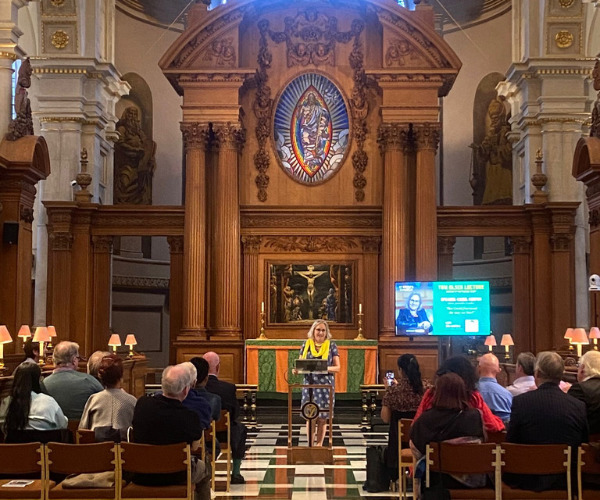NEWS

Olsen Lecture review: Coronavirus – the human cost and a holistic solution
Written by Simon Greaves, Court Member of the Guild of St Bride
On 6th September St Bride’s was delighted to welcome Carol Cooper, doctor, author and journalist, to deliver the annual Tom Olsen Lecture. This annual feature in the church’s calendar began in 1991 and is given in memory of Tom Olsen, a former Sunday Telegraph journalist. Dr Cooper was introduced by Tom Whipple, Science Editor at The Times.
The coronavirus pandemic has exposed the fragility of society and the systems we depend on while society has taken a step backwards in terms of human values. Despite technological advances we no longer treasure and nurture established social structures.
As Dr Cooper put it in her appeal for a more holistic approach to the virus: “We have forgotten what is important. More connected than ever, yet without the connections that matter.” The doctor, journalist and author was speaking at St Bride’s Church under the lecture title: Has Covid Fractured the Way We Live? – assessing the effects of the pandemic on everyday life.
At the time of writing, Covid-19 infections in the UK are continuing to fall, according to the latest weekly Office of National Statistics figures. Around 1.1mn people in the UK had the virus in the week ending August 23, down from around 1.4mn the previous week. In total more than 188,000 people have died in the UK within 28 days of a positive test.
Most recently, China has intensified efforts to rein in outbreaks of Covid-19 ahead of a major political meeting by placing about 65mn people under semi-lockdown. Thirty-three Chinese cities – including eight major provincial and municipal centres – have been placed under China’s lowest “static management” tier of lockdown, disrupting the lives of an estimated 65mn residents.
In her assessment of the impact of the pandemic and successive lockdowns on the UK, Cooper highlighted several outcomes. Big winners were the public’s perception of the advice from medical journalists, the value of vaccines which saved an estimated 20m lives worldwide in their first year, and to some extent improvement in local community spirit. Another gain was the acknowledgment that mental healthcare was a vital component of a healthy society.
She explained how teaching at London’s Imperial College went online: “Teaching med students consultation skills on Zoom was a challenge. Very interactive as used actors to simulate patients. But body language can be crucial to communication. Implications for doctors of tomorrow who may graduate without a thorough grounding in clinical examination, without experience in picking up subtle clues from patients, and without having held a dying person’s hand.”
As for hybrid working and working from home: “WFH might save on clothes but costs more money (energy bills, for one) and has an effect on sharing ideas, mood, morale, and esprit de corps. Physical isolation even had an effect on those who normally work alone.”
In fact physical distancing, aided by booming social media, replaced social distancing with us more connected than ever. Side-effects included doom-scrolling and the polarising of opinion on issues such as mask-wearing and anti-vaxing.
At the same time families were forced apart by restrictions and victims died alone. The effects on well-being and mental health of young people – more than a third say the pandemic has caused long-term worsening of stress levels – included increased self-harming. Overall, well-being and confidence were found to be consistently lower in young people out of work, in education or from poorer backgrounds. As families found it hard to cope, child and adolescent mental health services, already inadequate, came under greater pressure.
The importance of schooling beyond learning became more evident, again showing disproportionate disruption among lower socio-economic groups. This extends to university education where Cooper said many students instead of flourishing were “just getting by”…whereas “Education isn’t the filling of a vessel. It’s the lighting of a fire.”
Health impacts were also reflected in increased use of alcohol and tobacco, again a third of all alcohol-specific deaths occurring in the most deprived fifth of the UK. Over 625,000 more young people smoke, compared to the start of the pandemic.
Dr Cooper also noted the increase in domestic violence. Refuge, the UK charity against domestic violence, reported that between April 2020 and February 2021 helpline calls were up 62 per cent. Coupled with this, unplanned pregnancies, linked to negative social and economic outcomes, rose from 1.3 per cent before lockdown to 2.1 per cent after.
In healthcare, GPs’ work has been changed for ever, two-thirds of consultations now being online, which, she says, makes her worry about the impact of remote consultations on clinical assessment. Then there is a collapse in ambulance and A&E provision because of hospital bottlenecks and huge gaps in social care. The NHS has failed to meet a target of eliminating two-year waits by July. Currently 400,000 are waiting more than a year, the onset of winter bringing more delays and pressure.
She said recruiting and training more staff should be the new government’s priority, and summarised her talk by adding: “It’s hard to escape the conclusion that the NHS is dying from Covid.”
A lively question and answer session followed the lecture which was chaired by Tom Whipple. Thanks go to him, Dr Cooper, and to Kaizo for its continued generous support of the event.
Posted On: Thursday 13th October, 2022
READ OR LISTEN TO OTHER SERVICES

STAY UP TO DATE
WITH NEWS FROM ST BRIDE’S
Subscribe to our newsletter to receive alerts for
events and advance information about seasonal services.
We protect your data and never overwhelm your inbox.
SUBSCRIBE